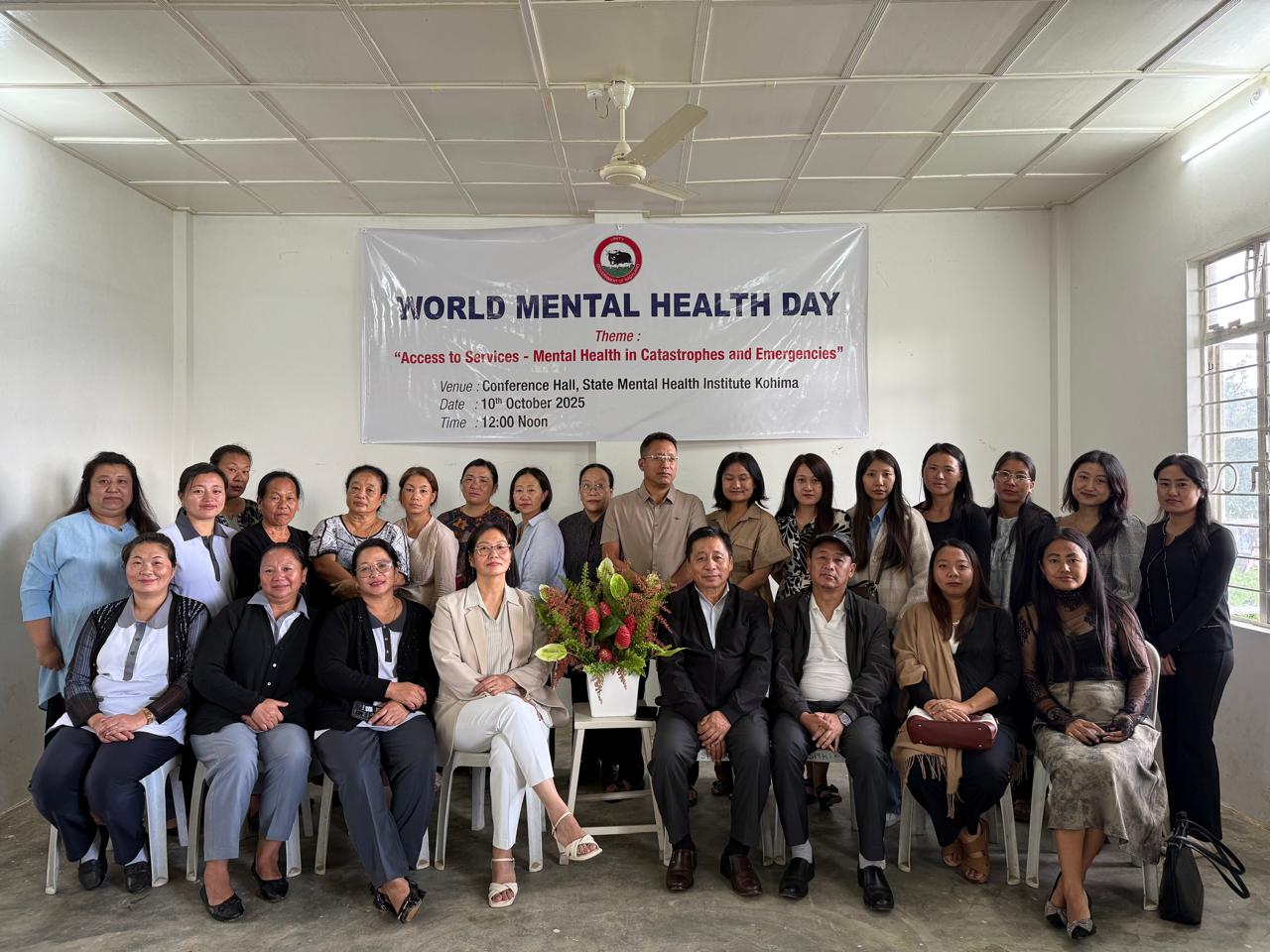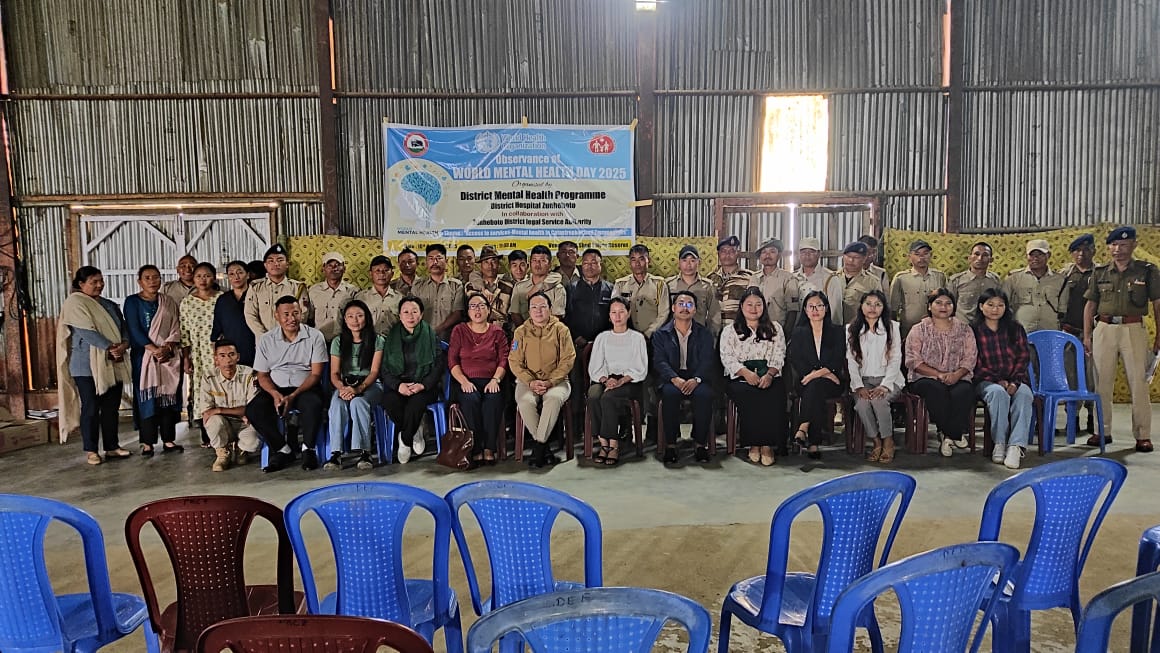FRIDAY, OCTOBER 10, 2025
- Home
- World Mental Health Day observed across Nagaland
World Mental Health Day observed across Nagaland
World Mental Health Day was observed across various districts in Nagaland on the theme ‘Access to services: Mental health in catastrophes and emergencies.’
Share

DIMAPUR/KOHIMA — World Mental Health Day was observed across various districts in Nagaland on the theme ‘Access to services: Mental health in catastrophes and emergencies.’
State Mental Institute Kohima: At the State Mental Institute Kohima's World Mental Health Day observation, Senior Medical Officer Dr. Nuvotso Khesoh emphasised that mental health becomes increasingly vulnerable and critical during disasters, conflicts, and crises, stressing the need to prioritise it.
Dr. Khesoh highlighted that while physical damage from disasters is visible, psychological wounds of trauma, grief, anxiety, and despair often linger longer.
He noted that nearly everyone in crisis-affected populations experiences emotional distress, with many developing diagnosable mental health conditions due to disrupted access to medication, treatment, and support networks, especially for those already living with such conditions.
Also read: NSCN (R) urges GoI to expedite peace process
The medical officer emphasised that while emergency responses typically prioritise food, water, shelter, and medical care, mental health and psychosocial support (MHPSS) are equally crucial.
He outlined key areas, including immediate psychological first aid, screening and early intervention for high-risk groups, continuity of care, and community-based support systems. Training frontline workers to recognise mental distress and provide referrals is essential for strengthening resilience. As he noted, “When mental health is integrated into emergency response from day one, we not only reduce suffering but also strengthen communities to rebuild more robustly.”
Dr. Khesoh also drew attention to ongoing challenges such as limited resources, damaged infrastructure, shortage of trained professionals, stigma, poor access in remote areas, and weak coordination among agencies. He observed that long-term mental health support is often neglected once the immediate crisis passes.
Calling for local action, he suggested several steps that can be implemented at the institutional and state levels. These include developing disaster-ready mental health plans, expanding mobile and tele-mental health services, building local capacity through training, and engaging communities in awareness campaigns.
He further urged partnerships with NGOs, government bodies, schools, and faith-based organisations to strengthen mental health preparedness and advocated for greater policy attention and budget allocation for crisis mental health care. “Let us view disasters not just as challenges but as opportunities to strengthen our mental health systems,” he added.
The programme was led by Dr. Tiakala Walling, SMO SMHIK, while welcome address was delivered by Dr. Khriesilie Sachu, Medical Superintendent, SMHIK.
Mokokchung: World Mental Health Day, organised by the District Mental Health Programme, was held at DMPH Treatment Centre, Mokokchung.
Exhorting the gathering, Dr. Ademla Tinu, Medical Superintendent of IMDH, stated that “mental health is part of our overall health; there is no health without mental health,” a DIPR report stated.
Emphasising on the stigma and lack of awareness as barriers on mental health, Dr. Tinu added, “We must understand that there is no shame in talking about mental health. It is totally preventable, curable and reversible; learn to balance work and life, nurturing healthy relationship in society, workplace and family.”
Presenting an overview of mental health, Dr. Limanaro, DPO (UIP & RCH), stated that “mental health and physical health are inseparable.” She encouraged open discussions on mental health, stressing its importance, and urged people to join hands in creating awareness and support for those affected.
Esther Jamir shared her testimony on behalf of the patient.

Zunheboto: World Mental Health Day 2025 celebration was held at the Drill Shed, Police Reserve, Zunheboto, with 70 participants, comprising police personnel and frontline staff.
In her address, Dr. T Tiamenla Phom, Additional SP, highlighted the stark gap between physical training and psychological preparedness in the police force.
She pointed out that during recruitment, police personnel receive training in arms handling, law, discipline, parade, and physical endurance, yet no structured training or orientation is provided on managing mental health, despite the emotional weight of their service.
She further noted that there is no appointed counsellor within the police department, leaving officers with no dedicated mental health support system, resulting in many silently enduring stresses.
“Those who stand guard for society often have no one guarding their mental health,” Tiamenla remarked, underscoring the human side of policing.
Easter H Yepthomi, Retainer Lawyer, ZDLSA, delivered a session on the NALSA Scheme 2024, highlighting the legal rights, services, and protections available to persons with mental illness and disabilities. She explained how understanding these legal provisions empowers law enforcement personnel to uphold the dignity, rights, and access to justice for individuals facing psychological distress, thus linking legal awareness to mental health advocacy.
Atolimi I. Khujumi, Clinical Psychologist, DMHP Zunheboto, emphasised that mental health is equally as important as physical health, especially in professions like policing where both mind and body are continuously under strain. She highlighted that police personnel, being the first responders during crises and disasters, are exposed to intense stress that often remains unaddressed.
Wokha: District Mental Health Programme (DMHP) Wokha, in collaboration with Wokha District Legal Service Authority (WDLSA), organised a marathon race at Wokha town.
The marathon, flagged off by Dr. Mhonchan N Kithan, Medical Superintendent of District Hospital Wokha, at Zero Point, concluded at Police Point, where winners were awarded by SDO (Civil) Echungbemo Erui. During the brief awareness programme, he encouraged participants to be mental health ambassadors.
Dr. Kithan highlighted common symptoms of mental health issues, including helplessness, loss of interest, sleeplessness, and hopelessness, advising participants to seek professional help.
Dr. Wothungo Jami, Psychiatrist, emphasised the importance of access to mental health care during emergencies and urged the public to support, rather than stigmatise, those with mental health conditions.

